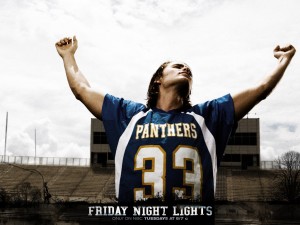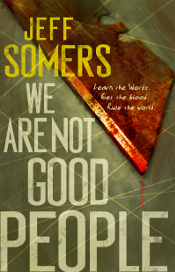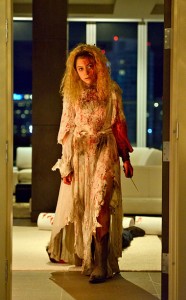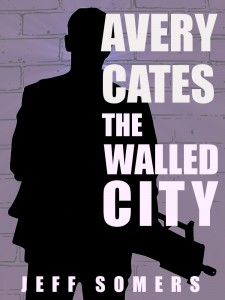
Jeff Needs Some Liquor Monies
Y’know, fiction and films and TV shows are supposed to entertain. And also inform and expose us to ideas and lifestyles, but for a lot of people entertainment is primary, and that’s fine. As a result, a lot of the stuff we consume–even the dramas and tragedies–are more or less uplifting, in a way, even if only by allowing us to be smug for a moment. After all, you might be bored and unhappy in your life, but at least you weren’t diagnosed with terminal cancer which inspired you to start baking meth, becoming a monster-god that destroys your whole family.
Sometimes, a particular aspect of our entertainments bothers me: The depiction of work. As in, jobs and careers, not, y’know, barn-raising with the community. With a lot of exceptions, a huge swath of entertainments depict careers and jobs as incredibly positive and life-affirming: People on TV shows (especially TV shows) and films are often shown either loving their jobs, peacefully co-existing in their jobs, or seeing their lives changed for the better simply by getting a job.
And in real life that’s very often bullshit.
Don’t get me wrong: Jobs are necessary. And if you’re unemployed, getting a job is the most important thing in your life. And everyone should have a way of contributing to society, and for most of us that’s going to be a job: Performing meaningful labor in exchange for money which you then use to keep the economy’s plates spinning.
But, as someone who has worked jobs and who knows a lot of people who have jobs, I know one thing for sure: Jobs are much more frequently soul-killing boredom machines or even destructive stress factories than glorious life enhancements. Your job is much more like to suck than to be a wonderful place you can’t wait to get to, or even a more or less benign activity that fills your day and gives you beer money. And yet our entertainments constantly try to tell us otherwise.
Job as Adventure
You see this a lot in situation comedies, where a character who needs an arc winds up lusting after a career, and then gets a lot of A, B, and C plots depicting their struggle to get credentials, to netowrk, and finally get that job! And once they get that job, their lives change for the better. We could call this the Rachel Green Effect, from the Friends character. Rachel was a humorously aimless woman for much of the show, and in later seasons found her calling and pursued a career, and was therefore happy and fulfilled and mature.
Bullshit, of course, as anyone who actually has a job–much less gotten a job after being out of the corporate world for years, like Rachel was. Jobs suck. They eat up 8-12 hours of your day depending on your commute and other aspects, they force you to socialize with other people (shudder), and they put you under the thumb of other folks who may or may not be sociopaths or incompetents or boors. Yay job! Jobs erode your will to live and can ruin huge chunks of your life with misery.
Another trope in fictional careers is the Easy Button Job. The EBJ occurs when characters are given jobs that they are effortlessly and preternaturally skilled at and enjoy 100%. This is where it gets really awful, because characters with the EBJ are usually depicted as loving their career, and spending all their time on it because it’s just so goddamn enjoyable and fulfilling. They stay late, work weekends, are very successful and sought-after, and yet somehow also are usually depicted as having copious free time, lots of friends, and a lust for life.
Fuck that noise. Of course there are people in this world who “love what they do.” Of course there are people who work very hard and don’t mind and are rewarded as a result. That’s great. Most of us watch the clock until 5PM and then leap from our chairs with a song in our hearts, and when we’re on our deathbeds we will regret every moment we spent staring at a computer screen, selling our time off for pennies a minute.
Job as Salvation
And, of course, careers are frequently used as easy ways for troubled characters to find themselves, often with the implication that all anyone needs to settle down and start enjoying life is to get the right job. Or any job, for that matter. How do you know you’ve found the right job? Generally, you will be magically competent at it without any prior experience or training, and it will make you very happy and eager to leave behind your troubled past.
That first part, the ease with which fictional characters often pursue careers, is part of the entertainment factor, of course: No one wants to see Jimmy embark on his new career only to immediately become mired in training seminars, night school, and weeks, months, or perhaps years of being junior and shit on by the higher-ups. That’s understandable in a fictional work where the career is just a prop and not the point. But it’s still insane, because very few people decide out of nowhere to be, for example, salespeople and simply start killing it on day one. Most sitcoms present a white collar fantasy where you go from unemployed and possibly homeless or couch-surfing to working in a nice office almost instantly, and of course you’re always super excited about your new career.
Again, this is bullshit for most people, for whom a job is a way of not starving to death. Jobs can be stressful, boring, and restrictive–but even when they are interesting, fun, and exciting they’re still a matter of selling off your time for money, and I wish more TV shows and movies would address the fact that rather than being healing, transformative wonders that save souls, jobs suck.
The Illuminati Again
Of course, this is all part of the plan: Work is always celebrated in American culture, and no matter how hard you’re working you’re likely not working hard enough. We get very little vacation or other time off, yet the conversation is usually about people not working hard enough. Careers and work in general are celebrated as the solution to just about any problem. Depressed? A new career! Broke? A second job! It’s obviously beneficial to society as a whole that we all sell off our time in service of other people’s goals, and therefore a lot of media celebrates being a workaholic and devoting your life to your career, your job, the labor you’re doing for other people.
Your mileage may vary, of course. Some people do sincerely love their work. I love the work I do now–though it’s not a job, as I’m a freelance writer and author. When I did have jobs, I kinda sorta hated them. Admit it: So do you.









